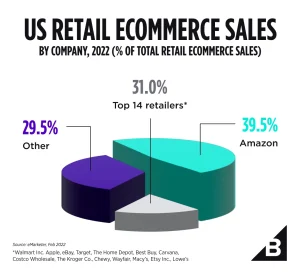
Few businesses dominate the technology sector, their dominance resulting from both direct and indirect network effects. These businesses usually possess access to clean data that allows them to develop intelligent algorithms.
Strong capital bases enable these firms to expand into new, typically adjacent markets. Their economies of scale and scope, coupled with high barriers of entry, help limit contestability in these new ventures.
Innovation
Big Tech companies typically command dominance in digital sectors through a combination of market success, network effects and economies of scope and scale. Their market control creates significant obstacles to entry for smaller businesses and startups looking to compete.
Amazon’s dominance can have far-reaching ramifications on consumer choices. For example, its e-commerce business may force smaller online retailers to adopt Amazon-branded solutions or decrease investments into technologies such as Augmented Reality (AR) or Machine Learning (ML).
Tech giants’ huge profits and positive growth forecasts may cause investors to reinvest capital directly into these firms, thus restricting start-up innovation potential. Furthermore, their acquisition inclinations could reduce entrepreneurial activity in favour of creating products for their own platforms – thus jeopardizing innovation across much of the global economy.
Market Power
Technology giants have expanded their market dominance and wealth into critical sectors such as health care and finance, yet their business models can raise serious antitrust concerns due to reduced contestability of rapidly changing digital markets. This can include locking-in effects for customers, bundling deals or restricting competition via barriers to entry.
These forms of market power can lead to increasing polarization between firms and widening wealth inequalities despite strong overall economic growth. Furthermore, value transfers via intellectual rents paid out by tech giants for use of but not ownership of digital technologies evade existing regulatory frameworks.
New IMF research indicates that certain indicators of market power–including markups of prices above marginal cost–have increased substantially across advanced economies over the past decade, perhaps reflecting faster technology-enabled productivity growth among dominant firms, or possibly reflecting welfare-reducing secular trends such as rising inequality. These findings reinforce the need for stronger competition policy approaches to control growing market concentration.
Competition
Big Tech companies have amassed massive customer and consumer bases, as well as significant market shares across multiple sectors. Their dominance is attributable to innovation, wealth accumulation and strategic acquisitions.
Big Five firms’ core businesses often feature steep growth trajectories and high barriers to entry, providing them with ample opportunity for diversification into adjacent markets – for instance Google, Amazon and Apple have expanded into cloud computing, online advertising and AI/robotics as a result of these advantages.
Network economies, economies of scale and economies of scope lead to highly concentrated market structures which limit contestability in fast-changing digital markets. Big firms’ large data dominance enables them to identify consumer trends and business disruptions before smaller competitors even realize what is going on – this gives them an unfair competitive advantage over smaller firms and inhibits innovation.
Regulatory Environment
As technologies created by these firms evolve rapidly, their regulation can present unique challenges. For instance, when entering financial markets via buy-now-pay-later services or digital wallets it can be hard to establish their true impact and the nature of competition they pose.
At a time when technology drives global markets, the world’s top tech companies deserve close inspection. Their successes have contributed to an economy where 10 percent of companies generate 80 percent of profits.
Public outrage over issues like data breaches and privacy concerns has not resulted in permanent changes to how Big Tech companies are regulated; even if that were the case, however, any proposed approach may or may not work given how lawmakers respond to incentives and pressures like money from Big Tech being funneled into their reelection campaigns.





